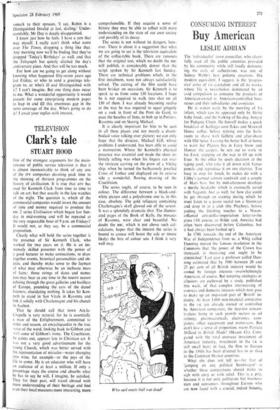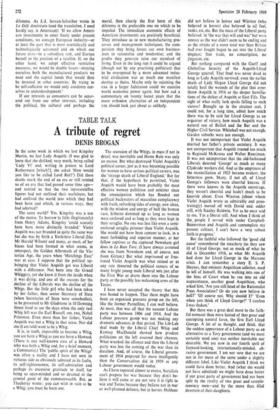Buy American
CONSUMING INTEREST LESLIE ADRIAN
The 'individualist' town councillor, who cheer- fully used all the public amenities provided by his community while still loudly denounc- ing the evils of collectivism, was one of Sidney Webb's best polemic creations. His modern equivalent, I suggest, is the 'progres- sive' critic of us capitalism and all its works, whose life is nevertheless dominated by an avid compulsion to consume the products of AmeriCan-owned or American-controlled busi- nesses and their subsidiaries and associates.
He is woken early by the mewling of his infant, which can be appeased only by Heinz baby foods, and the barking of his dog, hungry for Pedigree Churn. He himself makes a quick breakfast of Kellogg.s corn flakes and Maxwell House coffee. before retiring into the bath- room to shave with Gillette and after-shave with Old Spice. Leaving his better half at home to wash her Playtex bra in Fairy Snow and Hoover the carpets, he sets out to work in his Ford. stopping on the way to fill up with Esso. At the office he spiels dictation at the typing pool, who take it all down with Venus pencils and reproduce it on IBM electrics. Too busy to stop for lunch, he makes do with a Libby's canned salmon sandwich and a couple of Mars bars, but by mid-afternoon develops a terrific headache which is eventually cured with Veganin. Just as well; for how else could he get through an evening during which he must listen to a piano recital (on a Steinway) and drop in at a club (the Playboy), before putting the finishing touches to a Nixon- inflamed anti-dollar-imperialism letter-to-the press (IX course; as Wilde said, America had often been discovered before Columbus, but it had always been hushed up').
In 1780. towards the end of the American War of Independence from us. a Whig called Dunning moved the famous resolution in the Commons that 'the power of the Crown has increased, is increasing and ought to be diminished.' Last year a professor called Dun- ning estimated that by 1980 between 20 and 25 per cent of all British industry would be owned by foreign interests—overwhelmingly American, of course. But tempting analogies or allusions are eschewed by a study, published this week, of that complex interweaving of overseas and domestic interests which now goes to make up an important part of 'British' in- dustry. At least 1,600 non-financial companies in the uic are already owned or controlled by American companies; the heaviest concen- trations being in such growth sectors as oil refining. pharmaceuticals, electronics, com- puters, office equipment and motor-cars. But don't lose a sense of proportion, warns Patricia Millard in British Made? (Mason 42s). Com- pared with the total overseas investment of American industry, investment in the UK is still small beer; in fact, the flow to Europe in the 1960s has been directed less to us than to the Common Market countries.
What she does not tell us—for fear of `jumping on any political bandwagon'--is whether these comparisons should make us sigh with envy or with relief. This is a pity, because it is not only politicians but business- men and consumers throughout Europe who are now faced with a crucial, indeed historic, dilemma. As J.-J. Servan-Schreiber wrote in Le Dd/i Americain (and the translation, I need hardly say, is American): 'If we allow Ameri- can investments to enter freely under present conditions, we consign European industry—or at least the part that is most scientifically and technologically advanced and on which our future rests—to a subsidiary role, and Europe herself to the position of a satellite. If, on the other hand, we adopt effective restrictive measures, we would be double losers—denying ourselves both the manufactured products we need and the capital funds that would then be invested in other countries. By trying to be self-sufficient we would only condemn our- selves to underdevelopment.'
If our interests as consumers can be separ- ated out from our other interests, including the political, the cultural and perhaps the
moral, then clearly the first horn of this dilemma is the preferable one on which to be impaled. The immediate economic effects of American investments are positively beneficial. They introduce us to new manufacturing pro- cesses and management techniques; the com- petition they bring forces our own business- men to rationalise and modernise; and the profits they generate raise our standard of living. Even in the long run it could be argued (though not by any practising politician) that to be overspread by a more advanced indus- trial civilisation was as much our manifest destiny as theirs. Maybe only be rejoining the USA in a larger federation could we exercise world economic power again; but how sad a commentary on twenty locust years that the more orthodox alternative of an independent USE should look just about as unlikely.



































 Previous page
Previous page